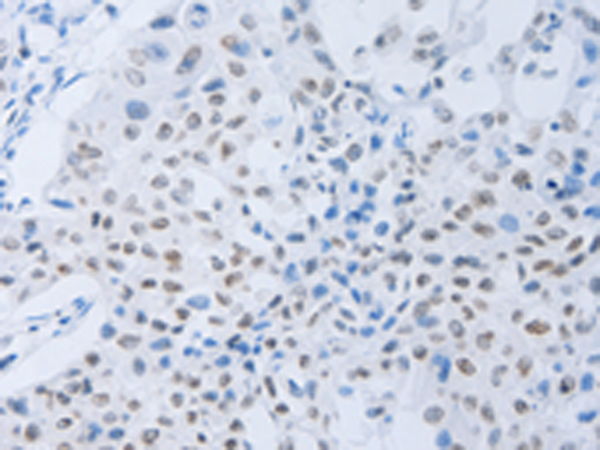
| WB | 咨询技术 | Human,Mouse,Rat |
| IF | 咨询技术 | Human,Mouse,Rat |
| IHC | 1/25-1/100 | Human,Mouse,Rat |
| ICC | 技术咨询 | Human,Mouse,Rat |
| FCM | 咨询技术 | Human,Mouse,Rat |
| Elisa | 1/2000-1/5000 | Human,Mouse,Rat |
| Aliases | FMS, CSFR, FIM2, HDLS, C-FMS, CD115, CSF-1R, M-CSF-R |
| Host/Isotype | Rabbit IgG |
| Antibody Type | Primary antibody |
| Storage | Store at 4°C short term. Aliquot and store at -20°C long term. Avoid freeze/thaw cycles. |
| Species Reactivity | Human, Mouse, Rat |
| Immunogen | Synthetic peptide of human CSF1R |
| Formulation | Purified antibody in PBS with 0.05% sodium azide and 50% glycerol. |
+ +
以下是关于CSF1R抗体的3篇参考文献及其摘要:
1. **文献名称**:*Targeting tumor-associated macrophages with anti-CSF-1R antibody reveals a strategy for cancer therapy*
**作者**:Ries CH, et al.
**摘要**:该研究报道了一种抗CSF1R抗体通过选择性耗竭肿瘤相关巨噬细胞(TAMs),抑制小鼠模型中肿瘤生长并增强化疗效果,为癌症免疫治疗提供新策略。
2. **文献名称**:*CSF1R inhibition with emactuzumab depletes microglia in mouse models of autoimmune disease*
**作者**:Pridans C, et al.
**摘要**:研究验证了抗CSF1R抗体(emactuzumab)在小鼠自身免疫疾病模型中有效减少小胶质细胞和单核细胞,提示其在神经炎症疾病中的潜在应用。
3. **文献名称**:*The role of CSF1R in the pathogenesis of Alzheimer’s disease: A preclinical study*
**作者**:Dagher NN, et al.
**摘要**:通过抑制CSF1R信号通路,该研究发现其可减少阿尔茨海默病模型中的神经炎症和淀粉样斑块沉积,表明靶向CSF1R可能延缓神经退行进程。
4. **文献名称**:*CSF1R as a therapeutic target in diseases: From mechanisms to clinical trials*
**作者**:Patel S, Pittenger C
**摘要**:综述总结了CSF1R在癌症、炎症及神经疾病中的作用机制,并分析了当前抗CSF1R抗体的临床研究进展与挑战。
这些文献覆盖了CSF1R抗体在癌症、自身免疫病及神经退行性疾病中的基础与临床研究。
The colony-stimulating factor 1 receptor (CSF1R) is a tyrosine kinase receptor primarily expressed on myeloid cells, including monocytes, macrophages, and microglia. It binds to its ligands, CSF1 and interleukin-34 (IL-34), regulating the survival, proliferation, and differentiation of these cells. Dysregulation of CSF1R signaling is implicated in diseases like cancer, inflammatory disorders, and neurodegenerative conditions, where excessive macrophage activation or accumulation drives pathology.
CSF1R-targeting antibodies are therapeutic or research tools designed to block CSF1R-ligand interactions or receptor activation. In oncology, they aim to deplete tumor-associated macrophages (TAMs) that promote immunosuppression and tumor progression. Preclinical studies show that CSF1R inhibition can enhance anti-tumor immunity and synergize with checkpoint inhibitors. In inflammatory diseases (e.g., rheumatoid arthritis), these antibodies may suppress pathogenic macrophage-mediated tissue damage. Neurodegenerative applications focus on modulating microglia activity in conditions like Alzheimer’s disease.
Several monoclonal antibodies (e.g., emactuzumab, cabiralizumab) have entered clinical trials, though challenges like compensatory signaling, variable efficacy, and on-target toxicity (e.g., liver enzyme elevation) remain. Research continues to optimize dosing, explore combination therapies, and identify biomarkers for patient stratification. CSF1R antibodies represent a promising strategy to modulate myeloid cell dynamics in diverse disease contexts.
×